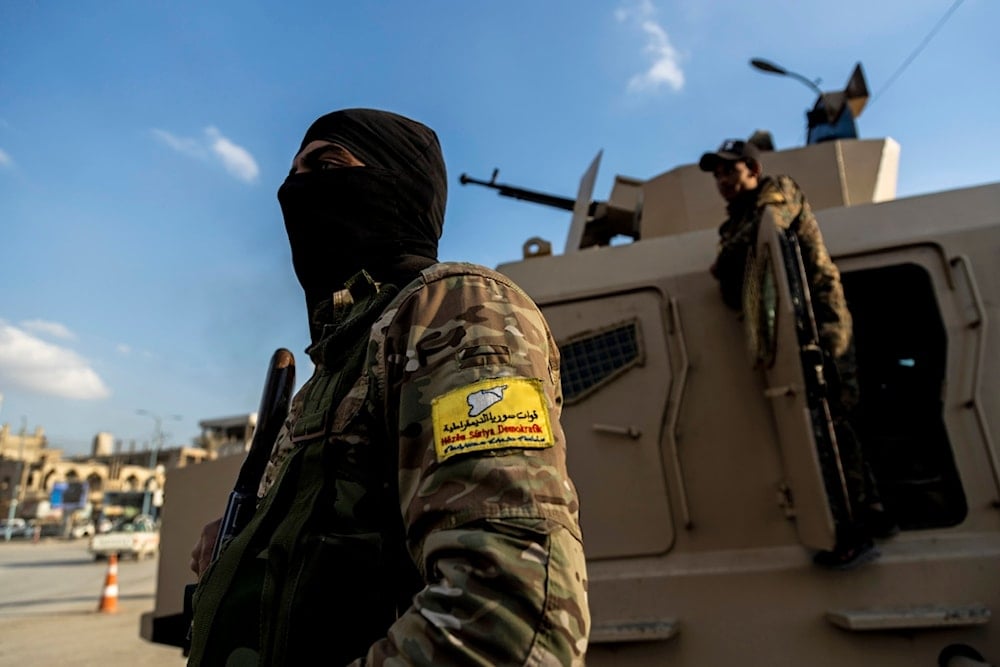Turkey's Erdogan warns SDF against stalling on Syrian integration deal
The Turkish president has warned that Turkey would not remain passive while the SDF continues what he described as "deliberate stalling tactics."
-

US-backed Syrian Democratic Forces (SDF) fighters stand guard at Al Naeem Square, in Raqqa, Syria, Monday, Feb. 7, 2022 (AP, File)
Turkish President Recep Tayyip Erdogan has issued a pointed warning to the US-backed Syrian Democratic Forces (SDF), accusing them of delaying efforts to integrate with Damascus and reaffirming Turkey’s commitment to Syrian unity.
The Kurdish-led administration in northeastern Syria signed an agreement with the new Syrian government in March to integrate into Syria's state institutions.
Erdogan pressures SDF to commit to Syrian unity
Speaking to reporters on a flight from Azerbaijan, Erdogan emphasized that Turkey would not remain passive while the SDF continues what he described as “deliberate stalling tactics” in the face of an opportunity to reintegrate into the Syrian state.
"We had said before we welcomed the agreement. But we see that the Syrian Democratic Forces are still continuing their stalling tactics. They must stop this," he was cited as saying by his office on Thursday.
The Turkish president's remarks come amid renewed talks between Kurdish-led forces and the Syrian government aimed at reestablishing centralized governance over northeastern Syria.
Turkey's position on SDF and Damascus talks
Ankara has long opposed the autonomy aspirations of the SDF, viewing it as an extension of the Kurdistan Workers' Party (PKK), which Turkey designates as a terrorist organization.
Erdogan has called on international actors, particularly the United States, to stop enabling what he sees as a separatist agenda in northern Syria.
While the SDF has held sporadic negotiations with Damascus, Turkey accuses the group of using diplomacy as a cover to entrench its positions, thereby stalling an agreement on integration.
Kurds accuse Damascus of centralizing decision-making
The ongoing negotiations are taking place in a complex environment marked by foreign involvement, territorial fragmentation, and contested governance.
The SDF, supported militarily by the United States, has maintained control over large parts of northeastern Syria, including its oil fields, since the territorial defeat of ISIS in 2019.
However, since the ousting of longtime President Bashar al-Assad in a swift offensive in December 2024, the group faces mounting calls to rejoin a unified Syrian framework.
Despite the March agreement, the Kurdish-led administration in northeastern Syria rejected a temporary constitutional declaration announced by the new Syrian authorities and said the new government failed to reflect the country's diversity, accusing it of centralizing Syria's decision-making.
Kurdish political leaders argue that any agreement must guarantee political representation and cultural rights, while Damascus insists on full sovereignty over all territories.
Damascus says unity of territory 'non-negotiable'
This month, Syrian Foreign Minister Asaad al-Shaibani warned that "the unity of Syrian territory is non-negotiable," adding that any delays in implementing the agreement with the Kurds would "prolong the chaos" in the country.
The agreement would see the integration of the Kurdish administration's civil and military institutions into the Damascus government.
It would also include all border crossings, the airport, as well as the oil and gas fields.
Syria, US agree on necessity of implementing SDF deal
In a statement issued on Sunday, the Syrian presidency said that interim President Ahmad al-Sharaa met with US Special Envoy for Syria Tom Barrack on Saturday.
Both sides agreed on "the necessity of implementing a comprehensive agreement with the SDF, ensuring the return of Syrian government sovereignty over all Syrian territories, while discussing mechanisms to integrate these forces within state institutions," the presidency said.
Read more: Heavy clashes renewed between SDF, Syrian army in Aleppo

 4 Min Read
4 Min Read










